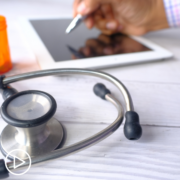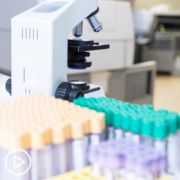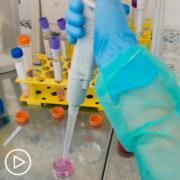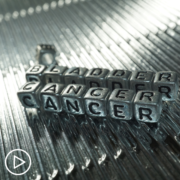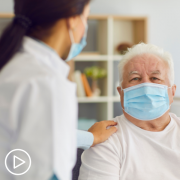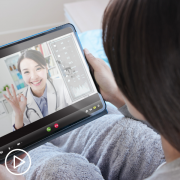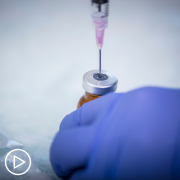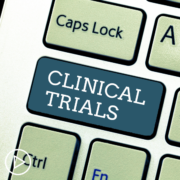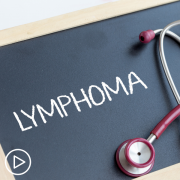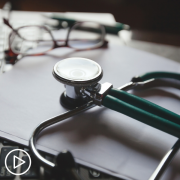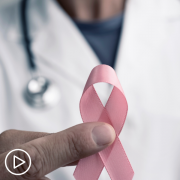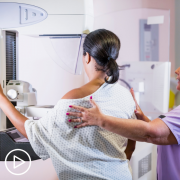How to Make an Informed Myeloma Treatment Decision from Patient Empowerment Network on Vimeo.
When faced with several treatment options, how can you decide on the best therapy for your myeloma? In this explainer video, Sandra and her doctor walk through important considerations when choosing a plan, and provide advice for partnering with your healthcare team.
Download our Myeloma Office Visit Planner to help you have productive conversations with your healthcare team, here.
See More From Engage Myeloma
Related Programs:
Transcript:
Sandra:
Hi, I’m Sandra. Nice to meet you!
Several years ago, I was diagnosed with multiple myeloma. I had bone pain and felt very tried so I went to see my doctor – my bloodwork indicated that it may be multiple myeloma and I was referred to a hematologist.
After a series of tests, my diagnosis was confirmed. I was overwhelmed when I learned that I had a blood cancer, but my hematologist, Dr. Reynolds, told me more about the condition and how it’s managed.
Here’s Dr. Reynolds – she can explain it further.
Dr. Reynolds:
Hi! I’m Dr. Reynolds, and I’m a hematologist specializing in the care and treatment of people with myeloma. The different types of myeloma are:
Monoclonal gammopathy of undetermined significance or MGUS (pronounced em-gus or M-Gus). MGUS typically has no signs or symptoms and is characterized by an abnormal protein in the blood or urine.
And, smoldering myeloma, which is a very slow-growing type of myeloma. It also does not present with symptoms. Patients with smoldering myeloma have a higher chance of needing treatment, so blood and urine studies are ordered regularly.
Last is multiple myeloma. Multiple myeloma is a buildup of plasma cells in the bone marrow that crowds out healthy cells, causing symptoms and other problems in the body.
Sandra:
As part of my diagnosis, Dr. Reynolds ordered a series of tests that included a blood test, bone marrow biopsy, urine test, and imaging.
Dr. Reynolds:
That’s right. We also did additional testing to identify any specific chromosomal or DNA abnormalities to get a better understanding of the genetic nature of the myeloma cells. The results of these tests helped us learn more about the extent of Sandra’s myeloma, her prognosis, and which treatment plan could be most effective.
Sandra:
After I was diagnosed and we had all of my test results, I met with Dr. Reynolds, and she walked me through the goals of treatment for my myeloma.
Dr. Reynolds:
Right! First, we talked about the clinical goals of treatment, which are to slow the progression of the disease and to induce remission.
And, it’s important to note that because each person’s myeloma is different, they are treated differently – be sure to discuss the specific goals of YOUR myeloma with your doctor.
Sandra and I reviewed the effectiveness of each treatment option, including how treatment would be administered, and took all of her test results into consideration to make sure we found the best, most personalized treatment option for her myeloma.
Sandra:
Next, we talked about another key treatment goal: symptom management. Dr. Reynolds asked me to let her know about any symptoms that I experience.
Dr. Reynolds:
Exactly, Sandra. A significant change in symptoms can indicate that it may be time to adjust treatment, if the symptoms are due to the prescribed medication, or that the disease might be changing.
Common symptoms may include fatigue or weakness, loss of appetite, excessive thirst, and weight loss, among others. This is why it’s important to not only have lab work and regular visits with your hematologist, but it’s essential to share about any symptoms you may be having, even if you don’t think it’s related to your myeloma.
And, last but not least, we discussed the most important treatment goal: Sandra’s goals. Sandra let me know that she’s very social and enjoys traveling and spending time with her family – we wanted to make sure she could continue doing the activities she loves.
Sandra:
Then, Dr. Reynolds reviewed each of the treatment approaches with me, including potential side effects and how it may impact my lifestyle. We discussed the pros and cons of each option, and we went over what our next steps would be if the treatment plan needed to be adjusted.
Dr. Reynolds:
Exactly! When deciding on therapy, you and your doctor may also consider:
- Your age and overall health,
- Any presence or history of other medical problems, and
- The financial impact of a treatment plan.
Sandra:
In addition to asking questions, my sister, Beth, took notes during our appointments, since it was often hard for me to absorb everything at once.
We also made sure to talk about the appointment on our way home, while the information was fresh on our minds. And we did our part by researching myeloma and bringing a list of questions to each appointment.
Beth found an office visit planner on the Patient Empowerment Network website that helped me organize my health info and questions.
Dr. Reynolds:
As you can see, Sandra and her sister were actively engaged in each care decision. It’s vital that patients feel empowered to speak up. If you can, bring a friend or loved one along to your appointment.
And, if you are able, it’s a good idea to seek a second opinion or a consultation with a myeloma specialist to help you feel confident in your care decisions.
Sandra:
Dr. Reynolds let me know that she would monitor my condition through regular physical exams, blood work and frequent communication. She made Beth and I feel included in the decision-making process, as if it were a collaboration.
Dr. Reynolds:
That’s right! This is a partnership. So, what steps can you take to be more engaged in your care?
- Bring a friend or loved one to your appointments.
- Understand and articulate the goals of your treatment plan.
- Ask about relevant myeloma testing.
- Learn about your options and weigh the pros and cons of each approach.
- And, consider a second opinion or a consult with a specialist.
Sandra:
That’s great advice, Dr. Reynolds. To learn more, visit powerfulpatients.org/myeloma to access a library of tools.
Thanks for joining us!


